Best circular saws for sale: our expert reviews cordless and corded models from Dewalt, B&W, Makita
This article contains affiliate links. We may earn a small commission on items purchased through this article, but that does not affect our editorial judgement.


Owning a decent circular saw can transform your DIY skills, saving you considerable time and effort besides making your cuts cleaner and more accurate. It’s important to choose the right kind of saw for the projects you’ll be undertaking, considering the power you’ll need for the work it needs to get through, to the type of cuts and accuracy required.
To give you a head start when choosing, we’ve picked out some of the best saws on the market and highlighted the kind of work they’re best suited for, but before checking out our recommendations, here are some general considerations you’ll need to make.
Best Circular Saws at a Glance:
- Best all rounder: Milwaukee M1 Redlithum Brushless Cordless Circular saw
- Best cordless saw for ease of use: Makita DSS611Z Cordless Circular Saw – Bare
- Best Compact Hand Saw: WORX WX439 XL Hand Saw - 500W
- Best cordless circular saw for value: Bosch PKS 18V Li-Ion Cordless Circular Saw
- Best value corded saw: DeWalt 1350W 240V Corded Circular Saw DWE560
- Best for trade standard cutting: Festool HKC 55 Brushless Cordless Circular Saw – Bare
- Best bargain: Vonhaus E-Series Cordless Circular Saw
- Best multi tool for specialist cuts: Stanley FatMax 230V 300W Corded Multi Tool
Corded or cordless?
One of the first decisions you should make is whether to opt for a circular saw that plugs into the mains, or a cordless model with rechargeable battery. Cordless tools offer greater portability and safety and, with rapid advances in battery technology, you’ll find they can offer perfectly adequate power for most DIY jobs. These days their biggest drawbacks are price and longevity – some older battery packs can become obsolete.
In this list we’ve tended to favour cordless models, but many of the manufacturers will also provide a similar model with cord attached at a lower price, so check to see what’s available before buying.
Brushed or brushless
‘Brushless’ refers to the motor used within a power tool. Without going into the technical aspects of how brushed and brushless motors differ, the latter tends to suffer less from wear and tear and gives you more power, efficiency and control. Inevitably, it also makes your power tool more expensive.
What’s the difference between a circular saw and a miter saw?
A circular saw is a handheld saw with a rotating blade that you push through the wood to make cuts. Although a miter saw also uses a rotating circular blade, the tool itself is stationary and the blade is pulled down onto the wood. The miter saw increases accuracy, particularly if cutting wood at specific angles, and will likely cost you more money.
For the beginner or occasionally DIYer, standard circular saws are often preferred. Besides the cost saving their portability makes them much more flexible for where, what and how you cut. The majority of saws in this piece are circular saws, although we have included a few that provide other specialist cuts.
Comfort, types of cut and other considerations
Other things to look out for are weight and comfort of your tools – the more you use them, the more this will become important. Make sure the saw is capable of making the cuts you need – such as angled or bevelled cuts – and check that its maximum cutting depth meets your requirements. If you want to cut anything other than wood then find out if you can buy a compatible cutting blade to suit the task.
Cross cut or rip cut
It’s also worth knowing your basic wood cuts when attaching the right blade. A ‘cross cut’ works against the grain and the blade usually has around 60 to 80 teeth. A rip cut goes with grain and uses a blade with fewer teeth (usually 24), and your saw will require more power to get through it.
To save you some valuable research time, we’ve done some research for you with this list. Pitched towards DIYers, including beginners, we’ve picked out some of the most respected brands on the market and highlighted the qualities that we think makes their circular saws stand out. We’ve consulted some expert tradesmen for their opinions and tested numerous saws ourselves, so whether you’re after a simple saw to save you on elbow grease, or have aspirations of DIY greatness, then there should be something here for you.
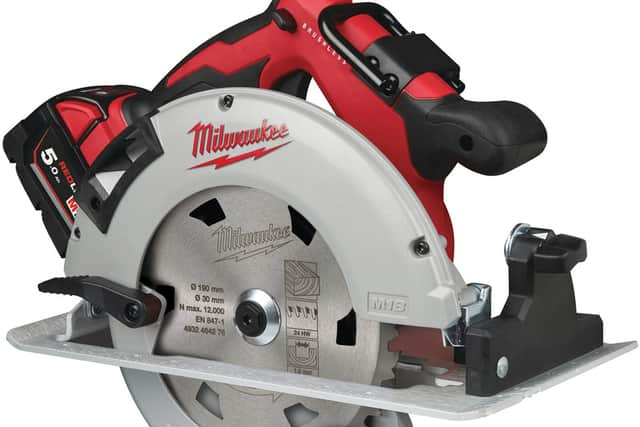

Pros: Solid build, easy to operate
Cons: Just one blade supplied
Milwaukee has plenty of brushless circular saws in its M18 range that boast plenty of power while being of a size that are not too big and easy to operate. Choose the power and cutting depth that best suits you and you’ll have a quality tool from a brand that tradesmen regularly put their trust in.
This saw sits towards the cheaper end of their range, making an ideal all rounder for DIYers after that trade performance. It has a 66mm cutting depth and the 4.0 aH Li-ion battery (included), which takes 80 minutes to charge, should keep you running for a good while.
It’s solidly built, with an aluminium guard adding to its secure feel, and can be adjusted to cut 0 to 50° bevels with a sturdy guide fence allowing you to cut neat, straight lines. It comes with just one 24-tooth blade which is predominantly for rip cuts, so for extra fine cutting you may wish to get a separate blade, but with the power and performance this saw provides there won’t be many DIY jobs it doesn’t fancy.
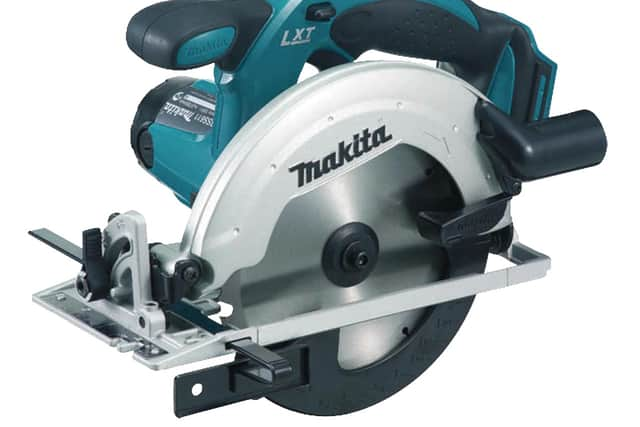

Pros: Excellent product at great value
Cons: No brake
Makita is one of the most popular brands among DIYers and it has an impressive range of circular saws to choose from. We’ve picked out this 18V cordless saw for providing top performance with good value, allowing you to quickly cut timber and plywood to length for a vast range of DIY projects.
Makita’s soft-grip handles are among the most comfortable to hold, which is important if you need a steady hand for long cuts. It provides a maximum cut of 57mm and you can adjust the 16-tooth TCT blade to bevel up to 50°. Makita’s tools are not only easy to use, but they also feel safe and strong, and this saw is fitted with a reassuringly secure spindle lock and riving knife to prevent jamming, although unlike some saws there is no brake.
For this price you won’t get the battery and charger, but if you want a reliable brand for all your DIY tasks then Makita is highly recommended so invest in one of its batteries and fill your shed with more products from its power tool range.
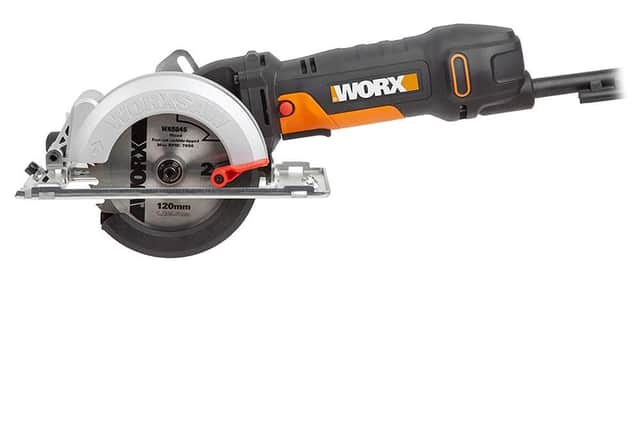

Pros: Multi-purpose compact saw
Cons: Mains powered
This Worx saw is a handy tool for cutting a wide array of different materials, including tiles, brick, metal, plasterboard, metal and, of course. The three 120mm diameter blades included in the price are a diamond tipped blade, TCT wood cutting blade and a HSS general purpose blade. It operates along similar lines to other circular saws in this list, with a metal base plate that can accommodate 45° angles, depth guide and safety guard, but its compact size and ergonomic design allow it to be operated with one hand.
Despite its small size it can still manage a cut depth of 46mm and, with the right blade attached, can get through metal 1mm thick.
Besides being useful for odd jobs around the house and garden, it’s also handy for cutting wood in places where a larger circular saw is tricky to operate – and with a decent level of power and performance you’ll get good clean cuts wherever you go. An excellent addition to the tool box for any level of DIYer.
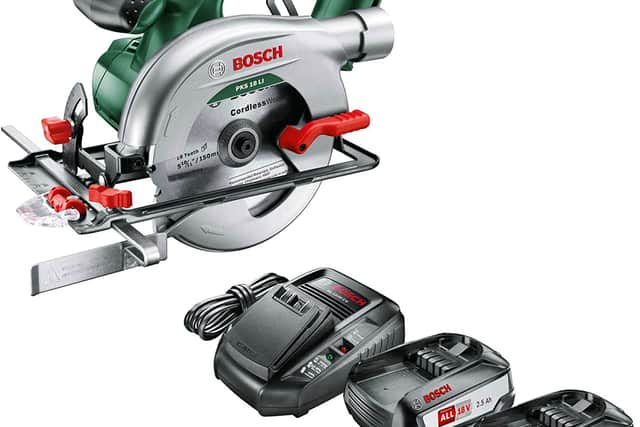

Pros: Cheaper than many of its competitors
Cons: A maximum cut of 48mm is a little shorter than most
Bosch’s brushed PKS cordless saw is a touch cheaper than most other comparable 18V saws on the market – and add on the cost of each of brand’s battery and charger and you’ll save even more (Bosch’s 2.5aH battery is around £47 and the charger £58).With an excellent range of other power tools to choose from, Bosch is a great brand to stick with for various DIY needs.
Its maximum cut is 48mm, which may be restrictive on some projects, but it can be rotated for cuts of up to 45° and the simple twist locks make depth and angle adjustments quick and easy.
A clear plastic, flip down cutter guide helps to get everything lined up and it steams through plenty of cutting tasks – we found it particularly effective for cutting large pieces of plywood to shape with minimal fuss.
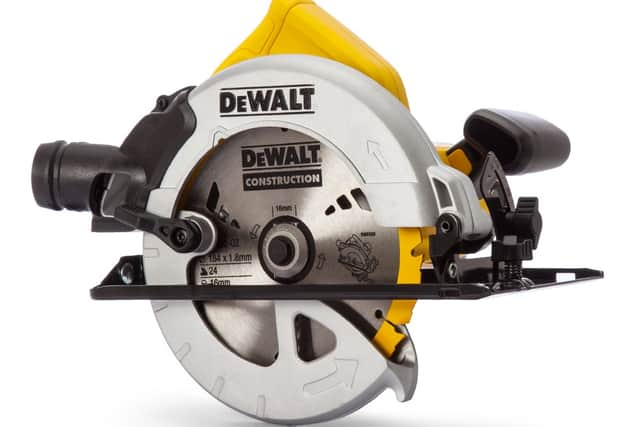

Pros: Great value and quality with a good cutting depth
Cons: Not cordless
For a similar price to Bosch’s cordless circular saw above you can get a corded saw from DeWalt, providing you don’t mind the inconvenience of the cord. Its 1350W of power makes it a good workhorse for numerous DIY jobs, allowing it to efficiently cut through timber and plywood.
It’s not too heavy and easy to operate, with a clean cutting action and clear view of the blade helping you to maintain a straight line.
It can cut to a depth of 65mm at 90° and even at a maximum bevel of 45° can manage a 42mm cut. Safety elements are well covered with a lock-off switch, spindle lock and rip fence and it has an electronic brake which rapidly stops the motor when releasing the trigger. DeWalt is another top brand that you’ll see on loads of building sites, so for the DIYer on a budget this corded model provides great value.
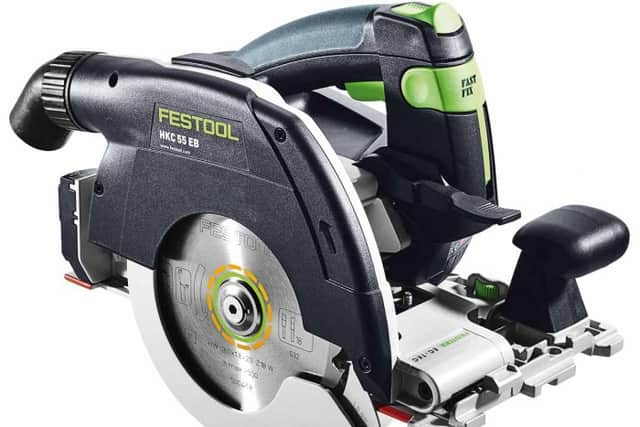

Pros: A variety of cuts with trade standard performance and brushless motor
Cons: Including battery pack, guide rails and other add-ons will significantly increase the cost
The Festool HKC 55 is able to produce a variety of cuts that marry speed with precision, making it a good investment for tradesmen besides DIYers who can afford the price (you’ll also need to factor in battery and charger costs). It works smoothly and efficiently as a mobile circular saw or, for an even greater range of precision cuts, you can fix a Festool cross-cutting guide that allows you to use it as a miter saw.
Just as its cutting action is smooth and effortless, so are the adjustments you make to its functionality, with each operating button clearly coloured in green. From changing the blade to angling the saw for bevelled cuts (up to 50°) everything works with minimum effort.
It’s easy to follow the cut line, even when angled, and you can simply adjust the cut depth with or without a guide rail. It comes with an 18-tooth HW standard saw blade, and cross-cut and fine cut blades are also available from Festool. Additionally, a Bluetooth compatible mobile dust extractor ensures that the extractor starts when the saw is switched on in auto mode.
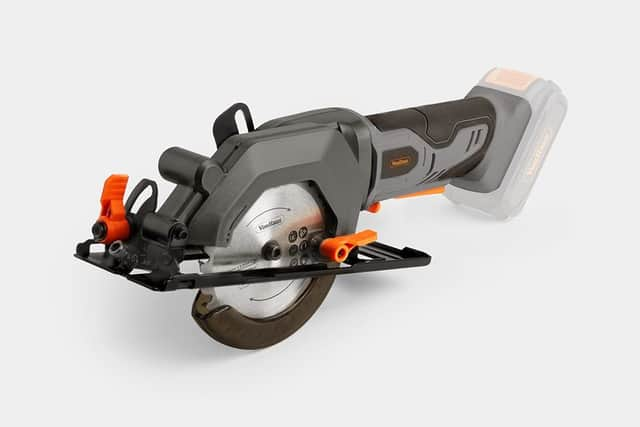

Pros: Great value compact saw with battery and charger included
Cons: Battery lacks the performance of more expensive saws
This neat little circular saw is ideal for anyone who only ever embarks on the occasional small DIY job. Its 2.0aH battery may lack the oomph of some of the bigger beasts on this list, but at 18V and with a no-load run time of 21 minutes, it still eases its way through a decent amount of wood, with a cutting depth of 43mm.
It’s ideal for shelving and basic furniture construction and comes with a dust pipe and edge guide, with all moving parts easy to adjust, including angling the blade to 45°. Its slim size, comfortable grip and portability – along with simple operating mechanisms – makes it ideal for those people who might be a bit nervous of operating mightier saws. With battery and charger included in the price we think this is something of a bargain.
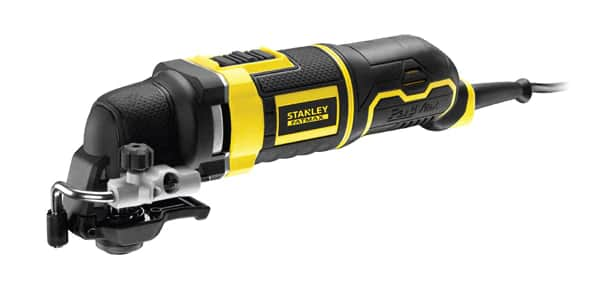

Pros: Useful tool for specialist cuts
Cons: Changing accessories requires a fair bit of effort
While our final suggestion isn’t a circular saw, it does come with some rounded blades that are extremely handy for awkward or tough cuts. The multi tool is a hand held device that can have various attachments fixed on its end that rapidly vibrate to cut, sand, polish and more.
Stanley produces around 25 attachments for its FatMax multi tool and you’ll get five of them with this purchase – a half moon blade, a 25mm wood blade, a 25mm bi-material blade, scraper and sanding plate. Each one locks in securely to the tool, although it does require considerable hand strength to squeeze open the clasp while you navigate the attachment into position. Once in use it’s much more comfortable to work with.
The carbide blade allows you to cut materials that you might not want to trust to an expensive circular saw and, due to its narrow, protruding shape, the 25mm blades are ideal for trimming off excess material, particularly if they’re in hard-to-reach places such as the bottom of a door. If you’ve got a lot of specialist cuts to make on a few DIY projects around the house, then this multi-tool makes an ideal companion to your chosen circular saw.
